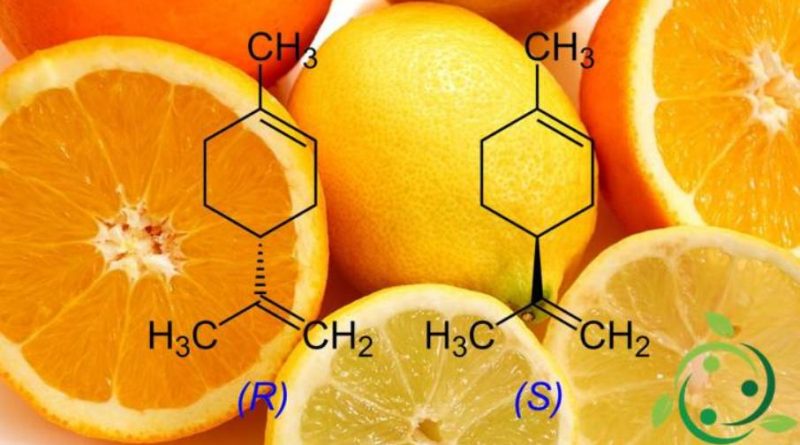Limonene
Limonene
The limonene is a hydrocarbon derived in nature from the geranyl pyrophosphate, by cyclization of the neryl carbocatione or its equivalent and subsequent loss of a proton from the cation to form the alkene. The brute or molecular formula is C10H16. Limonene is a chiral molecule, with enantiomere dextrogira and levogira forms and in the racemic form also called dipentenic. Thus, according to the IUPAC nomenclature, R – (+) – 4-isopropenyl-1-methyl-1-cyclohexene and S – (-) – 4-isopropenyl-1-methyl-1-cyclohexene. The biosynthesis of (-) – (4S) -limonene is catalyzed by the enzyme (4S) -limonene synthase.
In nature, limonene is present in large quantities in the peel of lemon and other citrus fruits and is responsible for the characteristic smell of citrus fruits. The limonene, at room temperature, is a colorless molecule, with an intense smell of oranges, lemons or turpentine depending on the chiral composition.
In nature the main chemical compound is D-limonene, or (R) – (+) – 4-isoproprenil-1-methylcyclohexene and is the one of greatest interest in terms of merchandise and therefore industrial.
The main uses of limonene are:
– for the synthesis of cosmetic products and toothpastes;
– in the food industry as an evaporator;
– in botany as an insecticide;
– in the synthesis of detergent products to confer citrus aromas;
– as a propellant for models;
– as a solvent for cleaning surfaces and the elimination of fatty substances on mechanical parts or for restoration operations;
– in the production of fine oil and oleo-synthetic paints in the fine arts sector;
– as a biofuel.
Consider that limonene can be obtained entirely from natural and therefore renewable sources, for which it has a very high ecological value and, in the future, a growing future use.
In the field of use as a solvent, it has the advantage of being less toxic and having a more bearable odor than solvents of the same polarity.
Recently the D-limonene (main natural product), some targeted research is trying to identify its potential function for a variety of medical applications, including cancer and AIDS. Recent studies seem to reveal that limonene has anticarcinogenic properties.
Also interesting is its use in the field of natural insecticides, where however, all the ecological aspects must be evaluated, as a natural product is not always synonymous with harmlessness.
In fact, among the contraindications to the use of limonene we must consider that:
– is a product with inflammable liquid and vapor;
– may be lethal if swallowed and enters airways;
– causes skin irritation;
– may cause an allergic skin reaction;
– it is very toxic to aquatic organisms and also with long lasting effects.
– Ultimately, the limonene is a molecule with great potential for use but, as always, we must evaluate every factor beyond the commercial interests of the party.
Warning: The information reported is not medical advice and may not be accurate. The contents are for illustrative purposes only and do not replace medical advice.

